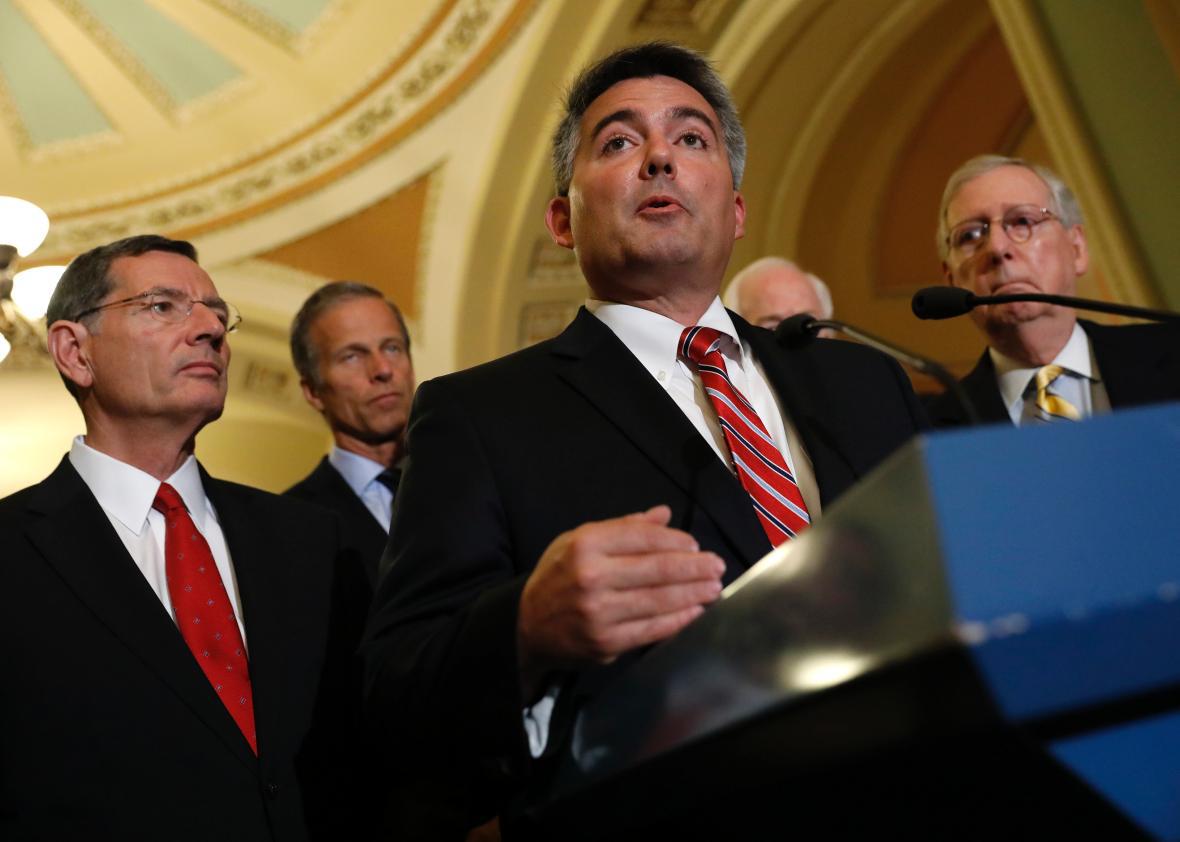On Monday afternoon, soon after a fifth woman went public with allegations that Alabama Senate candidate Roy Moore had made unnwelcome sexual advances on her when she was a teenager, National Republican Senatorial Committee Chair Cory Gardner, a Republican senator from Colorado, escalated the party response. Like Senate Majority Leader Mitch McConnell, Gardner called on Moore to withdraw from the race. But then he went a step further.
“If he refuses to withdraw and wins,” Gardner wrote, “the Senate should vote to expel him, because he does not meet the ethical and moral requirements of the United States Senate.”
The NRSC is a leadership vehicle. Gardner, by nature of his position, is a member of the Senate Republican leadership. His call for expulsion if necessary was not an off-the-cuff remark to a reporter. It was an official statement. One would have assumed that, before issuing this statement, Gardner would have run it by his fellow leaders, and that a flood of members would have been quick with statements backing him up.
Instead, most Senate Republicans seemed surprised by Gardner’s remarks and weren’t willing to back him up yet.
A few senators—Indiana Sen. Todd Young, Arizona Sen. John McCain, and South Carolina Sen. Lindsey Graham—strongly intimated that they would vote to expel Moore without saying the “e” word itself. (“Just play this out for Mr. Moore’s point of view,” Graham told reporters. “Winning there’s not winning here.”)
But Texas Sen. John Cornyn, the majority whip, said that he found it odd people were talking about expulsion before Moore was even elected. “I’m not going to speculate,” he said. Cornyn had just dropped his endorsement of Moore. Going from endorsement to expulsion in a couple of hours might have given him whiplash.
The “if true” caveats of a few days ago have disappeared from consensus talking points, and a lot of Republican senators insisted that they believed it was best for Moore to step aside. But they wouldn’t go further than that, or explained that they were too busy in pursuit of tax reform to have opinions on other matters. Even moderates repulsed by the Moore revelations, like Maine Sen. Susan Collins, were saying it was “premature” to talk about expulsion before the race was finished.
“The last time the Senate expelled a member was during the Civil War, and the process is complicated,” Collins said. “It’s usually because the individual does not qualify under the Constitution to be a senator. Now, there’s another process that you can go through with the Ethics Committee, but it seems to me that we’re getting way ahead of ourselves.”
So why was Gardner jumping out in front of his colleagues, who didn’t seem to enjoy fielding questions about expelling a hypothetical future colleague? Maybe he was taking one for the team, inviting the wrath of Moore loyalists on himself. Or maybe Gardner, who is in charge of electing Senate Republicans in 2018, was considering that he is also in charge of reelecting himself in 2020 in a state that Hillary Clinton won in 2016.
The only Republican senator on Monday with a stronger condemnation than Gardner’s against Moore was one of the senators who’s unbound himself from all political considerations: Retiring Arizona Sen. Jeff Flake.
“I don’t think it will get to that,” Flake told reporters when asked about whether he’d vote to expel Moore, “but if it does, yes.” When a reporter asked if he’d rather see a Democrat win than Moore, Flake broke new ground: “If the choice is between Roy Moore and a Democrat, the Democrat. No doubt.”
Don’t expect Cory Gardner to follow him there.
